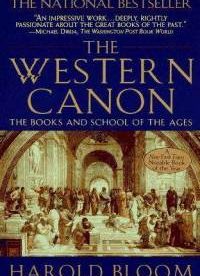

In my own case, at least, he has succeeded brilliantly. But Bloom's importance lies in providing vivid enough descriptions of some major works so that one is motivated to read them. If I understand Bloom correctly, he regards these authors as comprising the Western Canon, but he also has an appendix listing hundreds of authors that, I think, comprise the national canons of different countries. Bloom focuses on 28 authors he considers canonical and provides extensive descriptions and quotations from their work. That he could read all that he has, and in addition retain and catalogue all of it, is simply beyond my comprehension. To begin with, Bloom's erudition is staggering. This book has had the greatest influence on me of any book I have read in recent memory, for many reasons.

But, I figured it's time to give the master his due. So why am I just now getting around to reviewing it? Well for one thing I didn't have internet access when I bought it.

“An impressive work…deeply, rightly passionate about the great books of the past.”-Michel Dirda, The Washington Post Book World Read moreīloom Almighty: I first read this book about nine or so years ago, and I reread parts of it almost every day. Bloom's book, much-discussed and praised in publications as diverse as The Economist and Entertainment Weekly, offers a dazzling display of erudition and passion.

Placing William Shakespeare at the “center of the canon,” Bloom examines the literary contributions of Dante Alighieri, John Milton, Jane Austen, Emily Dickenson, Leo Tolstoy, Sigmund Freud, James Joyce, Pablo Neruda, and many others. Infused with a love of learning, compelling in its arguments for a unifying written culture, it argues brilliantly against the politicization of literature and presents a guide to the essential writers of the western literary tradition ( The New York Times Book Review). Harold Bloom's The Western Canon is more than a required reading list-it is a “heroically brave, formidably learned” defense of the great works of literature that comprise the traditional Western Canon. NOMINATED FOR THE NATIONAL BOOK CRITICS CIRCLE AWARD The literary critic defends the importance of Western literature from Chaucer and Shakespeare to Kafka and Beckett in this acclaimed national bestseller.


 0 kommentar(er)
0 kommentar(er)
